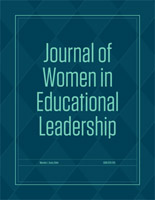Educational Administration, Department of

Journal of Women in Educational Leadership
Date of this Version
7-2007
Document Type
Article
Citation
Journal of Women in Educational Leadership, Vol. 5. No. 3 -- July 2007 ISSN: 1541-6224
Abstract
The purpose of the study was to explore the lived experiences of womcn university presidents related to becoming leaders or learning to lead. This manuscript highlights the research focused on the immediate family backgrounds and influences on these presidents. The research question was as follows: With regard to their family backgrounds and influences, what are the lived experiences of women university presidcnts related to developing into the leaders they have bccome today? According to Rubin (2004, p. 288), "Extraordinary challenges face higher education nationally, and leaders with exceptional capabilities are needed to help institutions meet these challenges." Within this new and constantly changing higher educational environment, leaders must have an exceptional set of capabilities and competencies to help institutions rise to new levels of excellence and innovation. For this reason leadership development has become a critical topic in higher education. The role and leadership abilities of university presidents and chancellors are of particular importance in higher education. The influence and power these leaders have on the direction and strategy of their institutions and the relationships they have with government officials, boards of regents, legislatures, business and community leaders, faculty, staff, and administrators are critical. Yet, even with the concern about the preparation of future educational leaders, little research explores the development of current outstanding university presidents/chancellors. Further, there is even less focus on the development of high-level women leaders in education or other arenas (e.g., government, business, non-profit). The literature continuously mentions the lack of women leaders in high-level positions and presents general strategies needed to make progress in this area; yet, few research studies have focused on the deep exploration and investigation of the backgrounds and experiences of successful women leaders. Understanding the influences, backgrounds, and career paths of women who have succeeded in obtaining and maintaining powerful positions of influence within higher education is essential in deepening and broadening our understanding of leadership development as a whole within higher education.


Comments
Copyright © 2007 Pro>Active Publications. Used by permission.